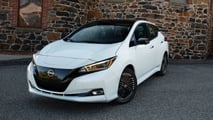
- Certain 2019 and 2020 Nissan Leaf EVs are being recalled due to a battery fire risk.
- The battery may overheat during DC fast charging sessions.
Nissan is recalling nearly 24,000 Leaf EVs manufactured in the United States because their high-voltage battery packs may catch fire while DC fast-charging. According to the National Highway Traffic Safety Administration (NHTSA), the recall affects 23,887 units built between August 29, 2018, and November 3, 2020, at the automaker’s plant in Smyrna, Tennessee.
When an affected EV is connected to a Level 3 fast charger, the battery could rapidly heat up, but there is no audible or visible warning from the vehicle. If the charging session continues, the pack may catch fire, which increases the risk of injury.
A definitive fix doesn’t exist yet and the exact cause hasn’t been pinpointed either. However, Nissan said that it is continuing to investigate the issue and that preliminary data shows the lithium-ion batteries in affected vehicles may experience excessive lithium deposits within the battery cells, which can increase the electrical resistance during fast charging sessions and potentially cause a fluctuation in the state of charge.
Nissan is working on a software fix that’s designed to prevent the batteries from catching fire. We don’t know how that will work, exactly, seeing how the Leaf doesn’t have an actively cooled pack, but the car manufacturer said the software update, which will be free, is expected to become available in November.
Owners of affected 2019 and 2020 Leaf EVs will be notified of the recall starting September 20. In the letter, Nissan advises owners to refrain from using Level 3 fast chargers until the issue is resolved. The recall includes models with the 40- and 62-kilowatt-hour battery pack, but all units are still under warranty.
Gallery: 2025 Nissan Leaf







The Nissan Leaf has two charging ports. One is for Level 1 or Level 2 charging from an AC source, while the other is a CHAdeMO connector for DC fast charging. Although the Leaf is getting a bit long in the tooth, having been on the market in its current form for seven years, it offers bi-directional charging, something that Tesla only figured out with the Cybertruck. But that alone hasn’t helped the Leaf with its sales figures–just 4,514 were sold in the U.S. in the third quarter.






